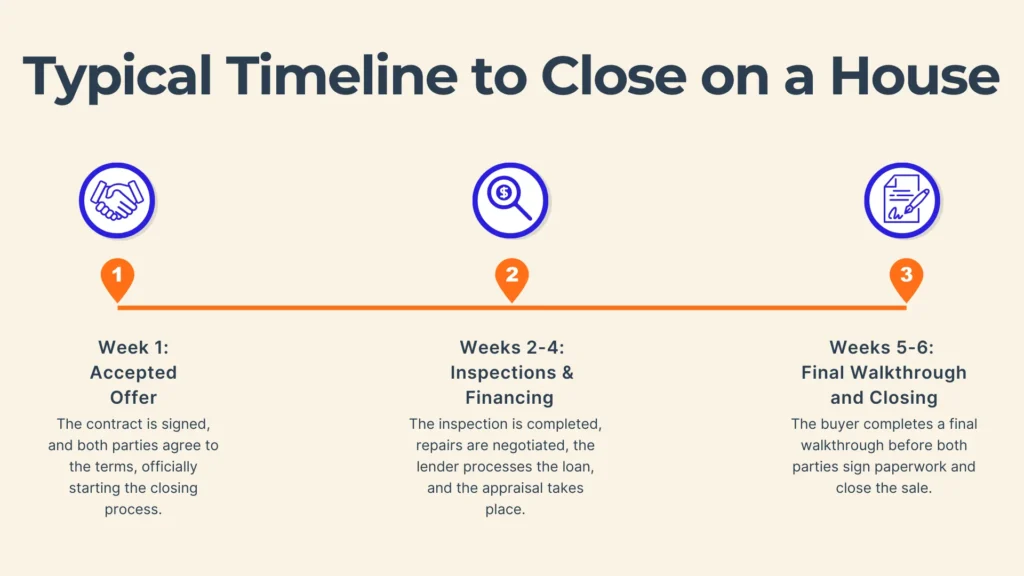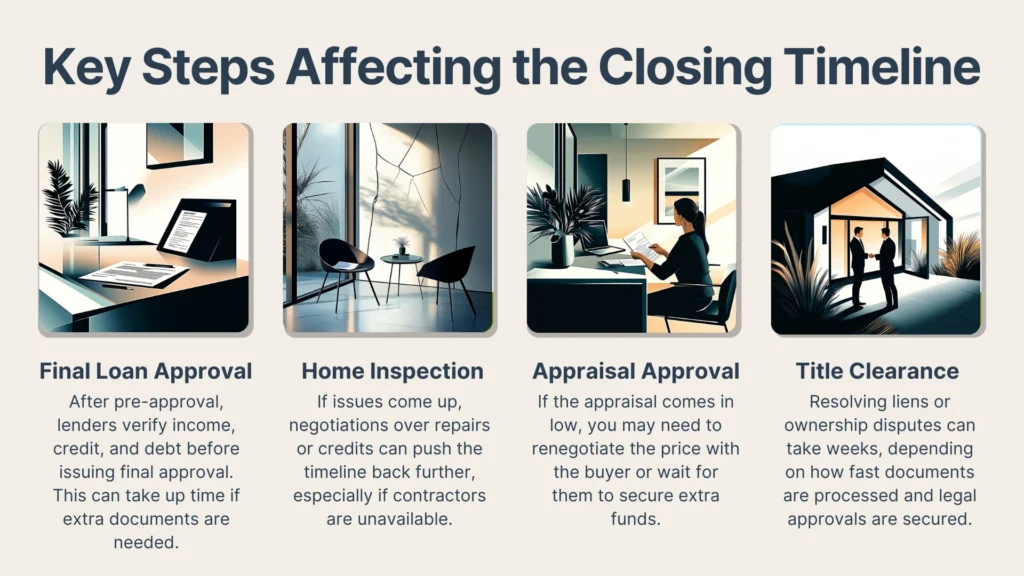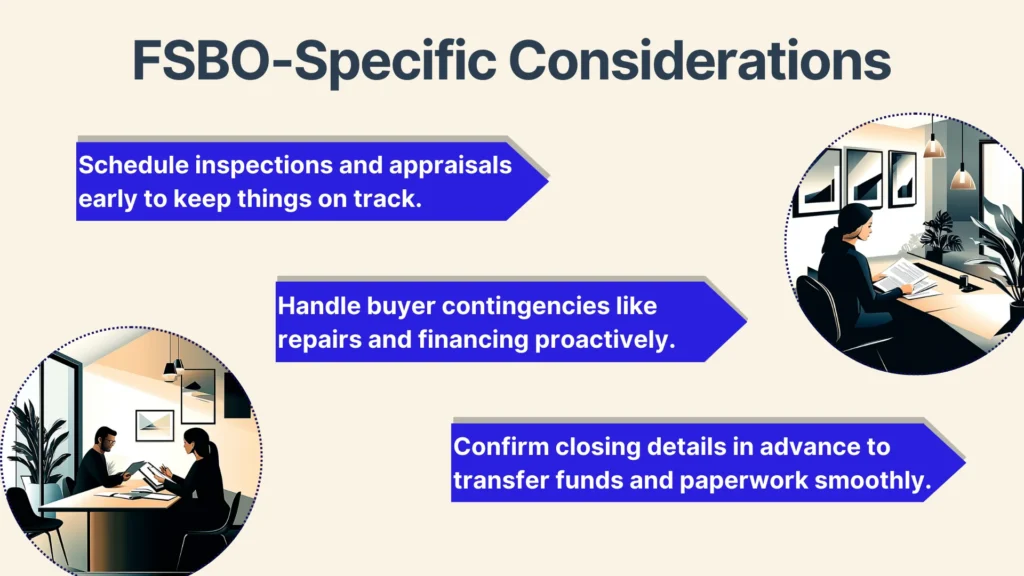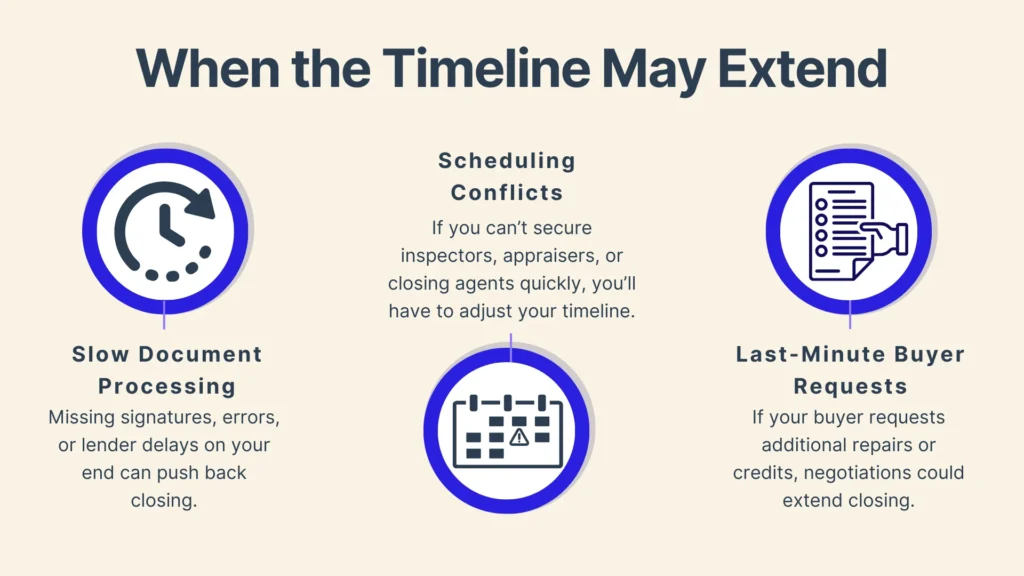If you're selling your home for the first time or deciding to handle it yourself as a For Sale By Owner (FSBO), you're probably wondering how long it takes to actually close the deal. Simply put, closing timelines depend heavily on factors like buyer financing, the inspection process, and how quickly paperwork gets handled.
While every sale is unique, there are common steps that most closing timelines follow. Knowing what to expect can help you avoid delays, manage your schedule, and close with confidence. Keep reading to learn how long closing usually takes and how to make the process smoother.
Understanding the Closing Process
Closing is the final step of selling your home. It involves paperwork, transferring ownership, and the exchange of money. On average, closing typically takes between 30 to 60 days, but some transactions can close in as little as two weeks if the buyer is paying cash and no major issues arise.
Inspection issues can significantly impact timelines, especially if major repairs are required. Understanding the timeframe for key steps like the appraisal, title search, and final walk-through can help you anticipate these potential delays. By planning ahead, you’ll be better equipped to keep your plans on track.
Typical Timeline to Close on a House
Most home sales finalize within one to two months after an offer is accepted. Factors such as loan approval speed, inspections, appraisals, and market conditions can all influence timing. To give you a better idea of what to expect, let's walk through the typical timeline step by step.

From Accepted Offer to Final Sign-Off
Once you’ve accepted an offer, the countdown to closing begins. As the seller, you'll need to stay on top of important tasks and track everything. Clear communication with your buyer and their lender will keep you on schedule.
As mentioned, most closings take 30 to 60 days. However, the process can take longer if financing takes longer than expected, documents are incomplete, or schedules don’t align. Managing inspections, appraisals, and paperwork efficiently will help you avoid setbacks.
The Role of Contingencies
Contingencies are conditions that must be met before a home sale can move forward, acting as safeguards for both buyers and sellers. Common contingencies include inspection, financing, and appraisal clauses, each of which can affect the closing period.
For example, an inspection contingency lets buyers negotiate repairs or back out if major issues arise, adding days or weeks. Financing and appraisal contingencies can also delay closing if lenders need more documents or the home appraises low, sometimes requiring renegotiation or alternative financing.
Local Market and Seasonal Variations
During peak home-buying times, like in spring and summer, timelines can stretch since inspectors, lenders, and agents often juggle multiple clients. Around the holidays, slower response times and limited availability can also push things back.
If you're aiming to close quickly, consider scheduling inspections, appraisals, and other important tasks before people plan to go on vacation. Booking appointments right away and taking a proactive approach keeps your sale on track and reduces last-minute stress.
Key Steps Affecting the Closing Timeline
Closing timelines can feel unpredictable, but understanding what goes into the process makes everything easier. Here’s a closer look at the key stages that can impact your closing schedule.

Pre-Approval and Financing
Getting a mortgage approved takes about two to three weeks, but this can stretch longer if additional paperwork like proof of income, tax returns, or bank statements are needed. Choose a lender with a strong track record for closing deals so they can guide you through the process and make things easier.
Experienced lenders often anticipate common issues and proactively request the right documents, helping you avoid anything that might slow down the process. Submitting complete documents upfront can also reduce the chances of frustrating back-and-forth delays.
Inspection and Negotiations
Home inspections generally take about a week to complete, but repair negotiations can extend the timeline if major issues arise. With nearly 17% of FSBO sellers already struggling with pricing and negotiations, problems like a leaking roof or outdated wiring can make reaching an agreement even more challenging.
Repair requests or credits tend to draw out negotiations because contractors usually need extra time to finish the work or provide documentation. Coordinating with your buyer to agree on a clear schedule for repairs or credits can help prevent unnecessary setbacks.
Appraisal Process
An appraisal is an assessment of your home's value conducted by a licensed professional and takes around one to two weeks. If the appraisal comes in low, expect potential delays as you and the buyer may need to renegotiate the price or explore alternative financing options.
Title Search and Clearance
A title search ensures there are no unresolved liens or ownership disputes on the property, helping you avoid last-minute surprises before closing. Most title searches wrap up within a week, but about 11% of transactions run into issues that affect the closing process.
These delays can be as simple as a paperwork error or as complicated as an old lien that needs to be cleared, requiring extra time and effort. To help keep things on track, work closely with your title company, review everything thoroughly, and address concerns early.
FSBO-Specific Considerations
Selling without an agent comes with unique responsibilities that may affect your closing timeline. Let’s break down what you need to be mindful of.

Handling Paperwork Without an Agent
As the seller, you'll be responsible for important documents like disclosures, contracts, and inspection reports. Missing paperwork is one of the top causes of closing delays, so staying organized can save you time and prevent costly mistakes. Be sure to double-check that all required forms are complete before your closing date.
Communication with Buyers and Their Lenders
To keep communication clear and consistent, FSBO sellers may need to coordinate directly with the buyer’s lender to confirm deadlines or resolve issues that arise. If you're unsure about legal details, consulting a real estate attorney can help protect your interests and prevent costly mistakes.
Managing Closing Logistics
Carefully planning your closing logistics will also help you avoid delays. Confirm a closing date early to align with your buyer, lender, and title company’s schedules. Reviewing your paperwork ahead of time allows you to spot missing signatures or incomplete forms, giving you time to address any issues before closing day.
Tips to Speed Up the Closing Process
While some delays are unavoidable, there are ways to make sure the closing process progresses efficiently. Here’s what you can do to keep things moving on schedule.
Prepare Documentation Early
Gather key documents like mortgage details, inspection reports, and repair records well in advance. Since incomplete paperwork is a common cause of delays, having everything organized can save you valuable time when buyers or lenders request information.
Be Proactive with Inspections and Repairs
Addressing major issues before listing or soon after accepting an offer can prevent drawn-out negotiations. If you’ve already made repairs, keep receipts and proof of completed work on hand to answer buyer questions quickly.
Maintain Flexible Availability
Quick responses to inquiries and being available for inspections or appraisals can significantly reduce delays. Since inspectors and appraisers may have packed schedules, being ready to accommodate appointments can help you stick to your target dates.
When the Timeline May Extend
Even with careful planning, some situations may push your closing timeline further than expected. Fortunately, you can help things stay on track by staying organized and responsive. These are some potential roadblocks to watch for.

Financing Hiccups
Loan complications can slow your closing if the buyer faces unexpected financing issues. This can happen if their credit score changes, their employment status shifts, or their lender requests additional paperwork. Buyers relying on down payment assistance programs may also face extra steps, further extending the turnaround time.
According to data from ICE Mortgage Technology, nearly one-third of mortgage applications experience setbacks — often due to missing documents or last-minute credit checks. Staying in touch with the buyer’s lender can help you address problems quickly if they arise.
Appraisal or Inspection Surprises
Unexpected property issues or a low appraisal can add extra tasks to do before you can close a deal. For instance, discovering mold or faulty wiring may require contractor estimates before repairs can begin.
If the appraisal comes in below the agreed-upon price, renegotiations may be necessary. This potentially means price adjustments or alternative financing options, which can extend the process by several weeks.
Title Complications
While title complications are rare, these issues can take many weeks to resolve if legal steps are required or if missing documentation must be tracked down. Working with a reputable title company can help minimize these risks by identifying potential problems early in the process.
Conclusion
Closing on a home doesn't have to be stressful, especially with tools like PropBox available. By automating tasks, organizing documents, and sending timely reminders, Propbox helps FSBO sellers navigate the entire process without the headaches. Plus, you'll avoid the costly 6% agent fee, putting more money back in your pocket.
With Propbox, you can stay on top of important steps, reduce your mental load, and potentially close faster — all at no extra cost. Selling your home on your own doesn’t have to feel overwhelming; with the right tools, you can confidently move forward and get the most out of your sale.
